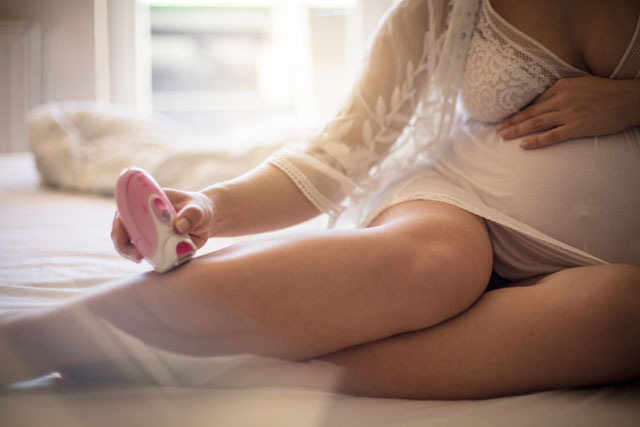Our bodies are unique and beautiful creations in their every inch. Gurus of body-positive thinking don’t get tired of persuading us that body hair is OK. And that if you want to keep it, it won’t make you look any worse. Any doctor will tell you the same thing, not because of their body-positive thinking but because it’s natural.
Millions of women don’t agree with this and do everything they can to get rid of unwanted hair. While there are a plethora of options, not all of them are considered safe during pregnancy. In fact, hair removal and pregnancy are surrounded by endless myths, which tend to have no ground. In this article, we’ve collected all currently available unwanted hair removal options to find out which are safe during pregnancy and which should be postponed until postpartum.
Pregnancy and All the Hair
When a woman gets pregnant, her body starts producing more estrogen. While this hormone works to support the developing pregnancy, it also becomes the cause of more intense hair growth. Sometimes, pregnant women start noticing unwanted hairiness in the areas they are expected least. For instance, they may have visible unwanted hair on the face, especially above the upper lip, the chin, and the temples. A common issue during pregnancy becomes the growth of hair in the abdominal area through the linea nigra.
During pregnancy, the problem with hair removal becomes especially acute because it tends to grow much faster, looks thicker, and feels stiffer than usual. There is even a pregnancy myth related to body hair during pregnancy. It says that moms-to-be whose hair on the legs grows fast can start picking from the baby boy names, while those who notice their legs becoming less hairy should consider baby girl names.
Hair Removal Options while Pregnancy
The main thing to remember about hair removal and pregnancy is that this procedure should be safe for the baby. The American Academy of Dermatology doesn’t have a single answer as to the safety of all the methods for hair removal during pregnancy. But it gives some advice on how to make depilation less stressful for a pregnant woman and maximum safe for the baby.
As for the hair removal methods we’ll outline in this post, they are:
- Laser and electrolysis;
- Waxing and sugaring;
- Creams and depilatories;
- Tweezing and threading;
- Shaving.
Overall, we’ll cover all popular methods to help you pick the one that will work best for you.
Laser and Electrolysis
As the name suggests, laser hair removal involves a laser, which destroys the hair follicle from the inside. This becomes possible due to the conversion of the light energy sent to the hair follicle into heat. The high temperature damages the sack of the hair, thus preventing the hair from growing. Although it is commonly considered a method of permanent unwanted hair removal, there is a chance that the follicle will restore and the hair will start growing again. For this reason, some women may need to undergo maintenance procedures.
When it comes to laser hair removal and pregnancy, there are a lot of controversies about whether it is safe for the baby. According to the American Pregnancy Association, there is no evidence of laser being dangerous for the fetus because the laser affects only the upper layers of the skin. At the same time, some healthcare providers do not recommend this procedure while pregnant.
Electrolysis is a procedure similar to laser depilation with the difference that it uses radio waves to damage the hair follicle. Unlike laser, the majority of healthcare specialists vote against electrolysis during pregnancy. Still, this is only a recommendation. Doctors, however, insist you should refuse the galvanic type of electrolysis as it may go through the amniotic fluid to the baby and harm it.
Waxing and Sugaring
Both waxing and sugaring have a lot in common. Either method can be used during pregnancy. The only thing to remember is that your skin becomes more sensitive during pregnancy.
Increased sensitivity results from hormonal changes and enhanced blood circulation. Therefore, the procedures may feel more painful and stressful than they are outside of pregnancy.
If you are going to wax unwanted hair at home, you should be careful and follow some pieces of advice from the American Academy of Dermatology. While waxing and sugaring at home might not be a problem in the first trimester of pregnancy, as your belly size grows, you may have trouble reaching certain areas, like the bikini zone. For this reason, many expecting mothers desperate to get rid of unwanted hairiness go to beauty salons, and here’s where they should be extra careful.
You must be sure the person performing the procedure uses disposable materials and antiseptics to prevent infection. Also, it’s essential to use soothing creams to reduce redness and irritation, which are common after sugaring and waxing during pregnancy.
Creams and Depilatories
These seem to be a good idea during pregnancy, as they don’t require much time or effort to perform the procedure. However, creams and depilatories are far from being called the best options. The primary reason for that is their composition. Depilatory creams contain calcium thioglycolate and barium sulfide powder. These are chemical substances that may become an issue for a pregnant woman.
First, they produce a distinct smell when applied to the skin, which may become a problem, especially in the first weeks of pregnancy when most women suffer from morning sickness. Besides, some properties of your skin change under the influence of hormones. So even if you’ve been using creams and depilatories before pregnancy, there is a chance you may develop an allergic skin reaction. Finally, no scientific studies support the safety of such products in gestation.
Still, if you choose to use them, ensure you do it in a properly ventilated room. Also, it’s worth applying some cream to a small part of your skin and waiting to see the reaction. If everything looks good, apply the cream to the areas you’d like to look and feel smooth.
Tweezing and Threading
Seemingly the safest option for expecting mothers is to tweeze or thread the unwanted hair. Neither of these requires you to use any chemical substances, lasers, or anything that may, in any way, harm your unborn child.
The only drawback of these methods is that they are more appropriate for small skin areas like removing the hair from above the upper lip or chin. It’s not likely that you’ll have the time and patience to tweeze the hair on your legs or pubis. Also, some women find them painful, though threading and tweezing are significantly less painful than waxing or sugaring can be.
Shaving
A good-old razor is one of the top choices among women, regardless of whether they are pregnant. Still, statistics say that the number of ladies shaving their legs and armpits is constantly falling, being removed by methods that provide a more lasting effect.
Shaving during pregnancy, especially in the final months of gestation, can be rather challenging. That’s because you can hardly see anything below your baby bump and the discomfort you feel when trying to get to the hard-to-reach areas. Some women handle shaving their unwanted hair without somebody else’s help, while others ask their partners to help them.
Choosing to shave your legs, armpits, or pubis, please, follow some safety rules, like:
- Ensure you find a stable position so that there’s no risk of falling;
- Use a new razor to reduce the risk of cuts;
- Opt for shaving gel or cream for sensitive skin to avoid irritation.
You can also lookup for more recommendations on safe shaving here.
Summary
The decision to remove body hair during pregnancy or not is only up to you. It’s all about your comfort and self-confidence. You have a wide variety of hair removal options to choose from. Each has some pros and cons, but any of them will help you remove body hair effectively.
FAQ
What to Do about Unwanted Hair while Pregnant?
There’s a variety of hair removal methods to pick from, including shaving, waxing, tweezing, laser hair removal, and others.
How Does Pregnancy Affect Hair Growth?
The hormonal boost happening during pregnancy intensifies body hair growth. You may notice your body hair growing faster. Also, it may be darker and stiffer than usual.
Is Laser Hair Removal Safe During Pregnancy?
Healthcare specialists don’t have a common opinion about whether laser hair removal and pregnancy are compatible. But there’s no evidence that laser hair removal is harmful to the unborn baby.
Is It Necessary to Remove Pubic Hair during Pregnancy?
No. There’s no necessity to depilate the pubic hair during pregnancy. It’s only up to you to decide whether you need this procedure or not.




